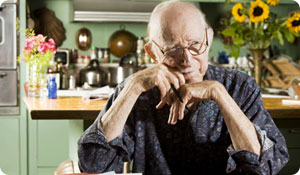
For millions of Americans, it's an all-too-familiar scenario: Suddenly, a loved one will start asking the same question repeatedly, telling the same story continuously, or behaving inappropriately. His or her close friends, spouses, or children notice it but dismiss it simply as "getting old." And who can blame them? We all forget things when we get older.
But then, friends, spouses, and children become increasingly concerned as the memory lapses get worse: Their loved one leaves a stove burner on or can't remember how to get home. The truth is, concern is very important at this stage: Memory loss is one of the early warning signs of Alzheimer's disease—a debilitating condition that affects more than 5.4 million older Americans.
Identifying the Symptom
It's important to pay close attention if your loved one is exhibiting unusual memory loss or any of the following early warning signs:
- Asking the same question repeatedly.
- Telling the same story several times.
- Forgetting basic life skills, such as how to cook or other activities accomplished with ease before.
- Forgetting how to pay bills or do other basic financial tasks.
- Getting lost in familiar surroundings, such as in their own neighborhoods.
- Stopping bathing and wearing the same clothes continuously. When asked about it, they insist they've bathed and are wearing clean clothes.
- Turning to others for simple decisions that they otherwise would tackle themselves.
As the disease progresses, patients may stumble over simple words, misplace objects in bizarre places, use poor judgment about simple decisions, exhibit rapid mood swings, become suspicious and fearful, have delusions or hallucinations, or simply lose initiative.
Experts warn, however, that having one or a few of these symptoms doesn't necessarily mean that your loved one has Alzheimer's or another form of dementia. But, according to the Alzheimer's Association, any of these signs warrants a visit to a neurologist or psychiatrist—medical professionals trained in diagnosing and treating such problems.





